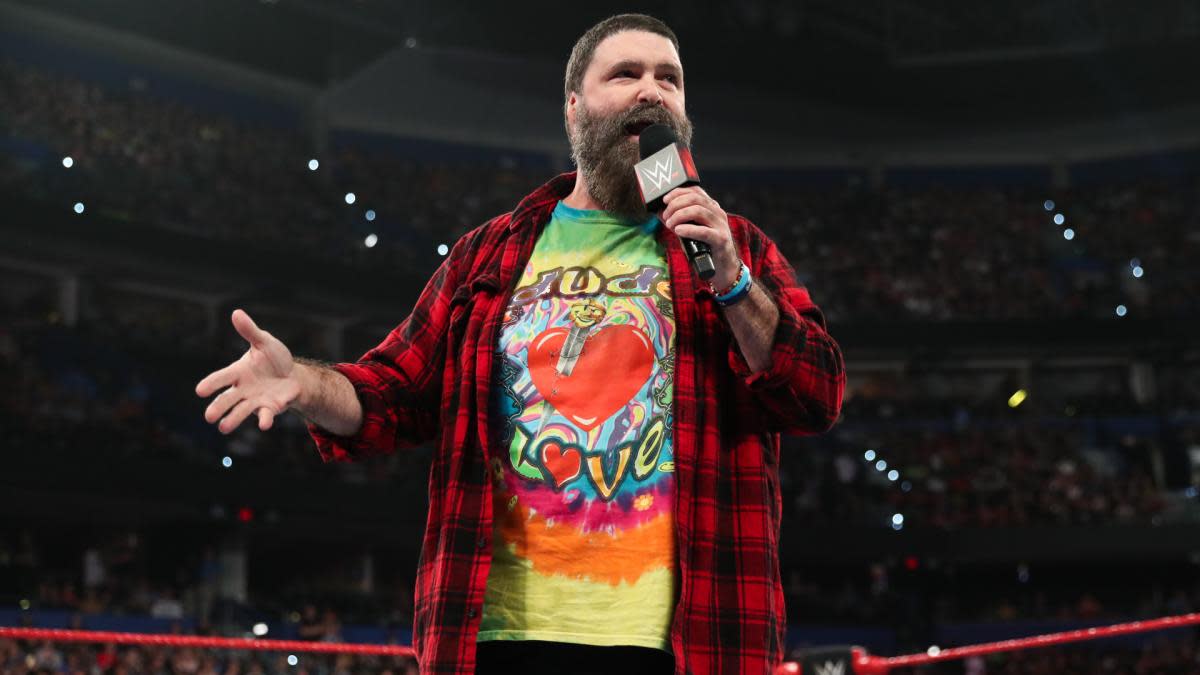Mick Foley Hits the Road for 20th Anniversary of Career-Defining Book


Mick Foley’s career forever changed after writing his first book, Have A Nice Day!: A Tale of Blood and Sweatsocks, in 1999.
The hardcore wrestling icon became a best-selling author, reaching number one on The New York Times Best Seller list with his memoir. Foley began to connect with the audience in new, previously unimagined ways, helping to pave an unforgettable career.
Foley’s career in wrestling was revolutionary, cutting psychotic-yet-salient promos early in his career as Cactus Jack, as well as leaving an indelible impression with his extreme style in the ring. Foley and Terry Funk wrestled in a “Barbed Wire Exploding C4” match in Japan in 1995, redefining the death match genre in wrestling. Foley also starred in WWE, defeating Dwayne “The Rock” Johnson for his first-ever run with the world title.
As much as it was to watch Foley’s career, people learned it was also a joy to read about it. Twenty years later, Foley has returned to the road for his “Nice Day Tour,” celebrating the moments of his career that led to his first unforgettable book.
Before the next leg of his tour, which starts up again on Tuesday in Columbus, Ohio, Foley spoke with Sports Illustrated to discuss memories of the book, whether he will ever write another memoir, and his connection with wrestling fans.
Justin Barrasso: What inspired you to go back on tour to celebrate the twentieth anniversary of Have A Nice Day?
Mick Foley: I’ve literally seen thousands of people over the years who carried the Have A Nice Day book with them, despite its weight as a big book, but people lug it around when they come see me. I’m always amazed at what the book meant to people. I thought the 20-year anniversary of the release of the book would be a good chance for me to bring the stories from the book to life on stage.
JB: So many of the stories from Have A Nice Day hold even more significance now, considering you wrote so poignantly about future legends in the book—like a trip to the beach early in your career with Steve Austin and William Regal, or the night you win your first WWE title and end up sharing your hotel room with the Blue Meanie, who was stranded in the hotel lobby.
MF: I don’t think people mind hearing stories they’ve already heard, as long as they’re good stories. In this case, people know almost every story I will be telling them because they’re all stories from the book, but it’s different when the author is not only telling them, but I also put a lot into them. It’s not a reading, it’s bringing the stories to life on stage.
JB: Another memorable story from the book is the famed “chocolate chip cookie” story you shared involving yourself, Dallas Page, Steve Austin when you were rooming together during a seven-day road trip.
For those that need a reminder, a fan had given you a huge plate of chocolate chip cookies, and you took it upon yourself to line out Page’s entire cot with the cookies between the mattress and the sheets. Page slept naked, which obviously added drama to the scene as he crawled into bed while you and Austin laughed at the absurdity of it all.
MF: I haven’t been asked about the “chocolate chip cookie” story yet during my tour, but that’s definitely one of my favorite stories in the book. It’s a great story about camaraderie on the road, and the things people will do to entertain each other even if it involves driving one of your best friends crazy.
During my show, I have a strict one f-bomb rule. If I share this story at a show, I’ll need to bring in a volunteer to play the role of “Diamond” Dallas Page and fill in all of his f-bombs. Over the years during different shows, I have told that story, and it’s funny how different volunteers get different laughs at different places for their takes on DDP. One of the best was former WWE writer Jenifer Bloodsworth, who would come out of the crowd dressed as DDP and really bring the house down. I’ll have to bring that story back.
JB: You created some unforgettable moments in wrestling, in both promos and matches. But is writing the book the event that changed your whole career?
MF: Without a doubt. It opened up so many doors. Most importantly, it made me believe that I was capable of doing more than I previously thought. Since the publication of that book, I’ve failed at a lot of things, but I’ve also been successful. I don’t know if I would have had the fortitude to step up to the plate and take my swings had I not had the experience of writing Have A Nice Day.
JB: You wrote stories that had personal meaning to you, but those same stories also inspired a generation of wrestling fans and ushered in a new era of wrestling books. Did you ever envision that your stories could also mean so much to those that love wrestling?
MF: Not at the release. The common thought, at least from what I was told in the literary world, was that no one would buy a wrestling book. We certainly proved that logic wrong. But even with the success of the book, I did not know that it was going to mean so much to people—I’m always grateful when people tell me that the book is still on their shelf long after they last read it, because it reminded them of a good experience while they were reading it.
I think it really struck a chord with people in a way that most other books did not. People found a kindred spirit in some ways, especially by reaching out to people who felt like they didn’t fit in.
JB: Part of the beauty of the book is your experiences with an array of legendary and colorful characters, from Vince McMahon to Sting to Vader to Terry Funk.
MF: I’m really lucky, and I’m even luckier that I do a decent Terry Funk imitation. I really enjoy telling stories about Terry, as I did last week during the ODB Appreciation Night where we raised money for ODB and her food truck.
I can take stories that I’ve experienced with Terry as a way of navigating my career. But each night is a different experience, especially because the questions are always 100 percent different on any given night. My goal is to take people on a different journey every night by changing up the stories, covering different periods of my career, dusting off some golden oldies, and doing my best to ensure that everyone leaves with a smile on their face.
JB: As wrestling fans, there are many of us who would thoroughly enjoy watching as you cut promos and built to a feud against “The Fiend,” though that is not going to happen. But would you consider writing another memoir, providing your perspective on the wrestling business while away from the ring?
MF: I don’t think so. I’ve already done five memoirs. The last one, Saint Mick, I understood going in that the audience was going to be very limited for a Christmas memoir. I do not think there is an audience for another wrestling book from me.
JB: You have a very busy stretch with upcoming shows in Columbus, Cleveland, Toledo, Cincinnati, Louisville, Dayton, and Pittsburgh all before Thanksgiving—and then you’re traveling to the United Kingdom for the next leg of the tour. What excites you most about the upcoming stretch?
MF: We raised almost $10,000 in one night for ODB, and that’s been one of the highlights of the entire tour. The crowd was really good and they really wanted to support ODB and get her cooking again on her food truck.
I am excited about the possibility of having some nice, full houses. Pittsburgh is shaping up really nicely. I’m excited about the other towns, too. I haven’t performed in Cleveland in at least five years, and it’s probably four since I’ve performed in Columbus, Dayton, and Toledo. I’m really hoping for a nice run. I’m going to mix up the stories, so if any of the fans from the Buckeye State want to go to multiple shows, they’ll catch a different show each time. I just feel really fortunate that I can go on stage in a pair of sweatpants and a flannel shirt and entertain people.
JB: How grateful are you for the people who have been so supportive of your career in both wrestling and writing?
MF: I never envisioned still being able to make a living off creating those memories, so I’m really grateful. I legitimately enjoy getting out there, meeting people, telling stories, and hearing people’s stories. It’s very gratifying and very enjoyable.
Justin Barrasso can be reached at JBarrasso@gmail.com. Follow him on Twitter @JustinBarrasso.
